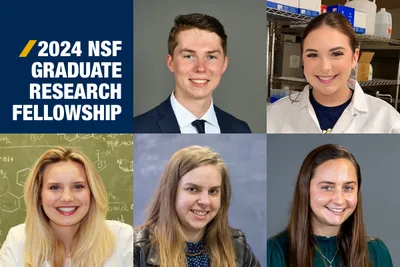Eberly News

Five WVU students named prestigious NSF Graduate Research Fellows
Two Eberly College students have joined an elite group of researchers who’ve been awarded the National Science Foundation Graduate Research Fellowship, a program aimed at supporting graduate education in STEM-based fields.
Eberly chemist makes insect wing discovery that could advance technology
The key to insect success may be their wings. That’s what West Virginia University researcher Terry Gullion, professor of chemistry in the WVU Eberly College of Arts and Sciences, has learned by studying the chemical composition of insect wings — something that has not been examined in detail until now.

Eberly staff members receive 2022 Outstanding Staff Award
Albert “JR” Taylor and Amanda Tustin have been named 2022 recipients of Eberly College of Arts and Science’s Outstanding Staff Award.
Chemistry professor receives $500,000 from National Science Foundation to develop portable diagnostic devices
MORGANTOWN, W.Va. – A research project led by
Dr. Peng Li, assistant professor of chemistry in the Eberly College of Arts
and Sciences, received $500,000 in continuing grant funding from the National Science
Foundation (NSF).

WVU chemist earns 2021 Young Investigator Award from Eli Lilly
Peng Li, an assistant professor of chemistry at West Virginia University, has been named a recipient of the 2021 Young Investigator Award from Eli Lilly.

Eberly College announces outstanding seniors, teaching assistants and Eberly Scholars
The Eberly College of Arts and Sciences has recognized 64 outstanding seniors, graduate teaching assistants and graduating Eberly Scholars for their academic achievements in 2020-2021.

Inspect to protect
Thanks to facility renovations, research innovations and in-class lessons, WVU's C. Eugene Bennett Department of Chemistry has received the nation’s top undergraduate safety program award in chemistry – for a second time.

Eberly College announces 2020-2021 outstanding staff and faculty awards
The Eberly College of Arts and Sciences has named recipients for its 2020-2021 awards for faculty and staff. In total, the Eberly College recognized 11 individuals across four categories for their talent, commitment and service to the College and WVU.

Meet the December 2020 Grads: Maryssa Beasley
Meet December 2020 grad Maryssa Beasley (PhD, Chemistry).

Experience, guidance and community
Thirteen first-year college students, including four enrolled in the Eberly College of Arts and Sciences, connected with WVU in July for a virtual summer camp to get a head start on their college experiences.
